- Home
- Dornford Yates
Brother of Daphne Page 3
Brother of Daphne Read online
Page 3
Then I called for mine host, and after ordering ginger beer for Judy and old ale for myself, slapped silver into his hand, and begged as many as would so honour her to drink the lady’s health.
About that there was no difficulty, and when I had despatched the original boy – who all this while had never wavered in his constancy to my proboscis – for a small tin pail, I prepared to get my burden once more upon my back. But this was not to be. Four good fellows insisted on constituting themselves booth-bearers, and the burly drayman gallantly relieved my fair companion of the box of puppets.
So we came in state to the grounds where the bazaar was to be held. The parley with the gatekeeper was of short duration, for the ‘workers’ scented money in our admission, and, with an eye to the Bananas’ main chance, made us quickly welcome. On my explaining our intention to put our efforts at their service, and any increment that might result into their pockets, their expression of gratitude was quite touching.
The entrance fee deterred some, and their daily occupation more of those who had formed our kindly escort, from following us into the fête, but I believe that most of them contrived to return before six o’clock.
When I think of all that I said and did on that sunny afternoon, I get hot all over.
I could not go very far wrong during the actual performance, but it was afterwards, when Judy sat smiling in the mouth of the booth, and I went forth, pail in hand, seeking whom I might devour.
I drew my arm familiarly through that of a reluctant curate, and walked him smartly up and down, discussing volubly the merits of my nose in tones which suggested that I had no roof to my mouth. Did a lady protest that she had already contributed, I repeated “Oh, madam!” reproachfully and crescendo till the hush-money was paid, while in front of those who affected not to see my out-stretched hand, I stood as if rooted to the spot. I borrowed the vicar’s wideawake, ostensibly for a conjuring trick, and wore it assiduously for the rest of the afternoon and, on his demurring to such use, I explained, in the voice of G P Huntley, that it went so well with the nose.
In short, I played the mountebank to a degree that astonished myself, but apparently to some purpose, for the money came in properly.
The performances went with a bang, and when, at the conclusion of the playlet, I lifted Judy to the rickety shelf, so that her head and shoulders were framed in the mouth of the booth, it was the signal for a burst of applause.
On one of these occasions: “It’s not fair that I should take every call,” she said, looking down at my upturned face.
“My dear Judy, I have my reward.”
“What?”
“Don’t I lift you up every time?”
She laughed pleasedly.
“Gallant Punch, you’re easily satisfied.”
“Am I, Judy – am I?” I said gently, taking her hand.
“Yes,” she said, snatching it away. “ You are and will be. Go out and get the money.”
I adjusted my nose thoughtfully.
Daphne was, of course, in great evidence. Anxious to run no unnecessary risk, I avoided her when possible, and when I did find myself in her proximity, I at once indulged in some of my more extravagant behaviour.
“Where’s your brother?” I heard a worker say.
“Brother!” said Daphne bitterly. “Coward! And I really thought we should have him this time. Fled to London before we were up this morning, thank you. From the amount of food he took with him, and the way he took it, anyone would have thought he was an escaped convict. Guilty conscience, I suppose. One hears a good deal about record flights nowadays, but I’d back my miserable brother against any aviator. My husband’s promised to look in about five, if he’s back from Huntercombe. That’s something. But they’re a wretched lot. Oh, here’s one of the Pierrots!”
I hung the pail on my nose and looked at her.
“As one of the organizers of the fête,” she said hastily, “I must thank you—”
“Nothing doing, madam,” said I, in an assumed voice.
“But—”
“Free list entirely suspended, madam,” and I shook the pail mercilessly.
A small and grinning crowd had begun to collect, so Daphne parted up with a forced smile, and I went off chuckling to queer the animals’ race.
Our penultimate performance was over, and I was in the midst of my vagaries again, when I saw Berry. Unanxious to tempt Providence, I retired precipitately to the shelter of the booth. My companion was sitting disconsolately upon the box on which she stood to work her puppets.
“Is it time for the next show?” she said.
“Not for a quarter of an hour.”
I sat down at her feet and removed my mask and nose.
“I’m afraid I persuaded your hand last time, Judy.”
“You touched it.”
“Let me look.”
“It doesn’t show.”
“Let me look.”
After examining the knuckles carefully, I turned my attention to the soft little palm.
“Obstinacy,” I said. “Obstinacy is clearly indicated by the dimple situate below Saturn and to the right of the watering-pot.”
She tried to draw it away, but I tightened my hold and proceeded with my investigation.
“A gentle and confiding nature, characterized by a penchant for escapade, is denoted by the joy-wheel at the base of Halley’s Comet. And so we come to the life-belt. This – my word, this is all right! Unrivalled for resistance to damp and wear, will last three to six times as long as ordinary paint – I mean life – of extraordinary durability. Now for the heart-line. The expert will here descry a curious mixture of—”
Further investigation she cut short by so determined an attempt at withdrawal that I let her hand go.
“Oughtn’t we to be beginning again?”
“You’re very eager for the last show.”
“No, I’m not, but I want to get it over.”
“Oh, Judy!”
She laid her hand on my shoulder.
“No, Punch, no, I didn’t mean that. It’s been – great fun.”
“It’s sweet of you to say that.”
“It’s not. Don’t you think I’ve liked it?”
I leaned forward.
“Dear Judy,” I said, “very soon it will be over, and we shall go our several ways once more. And if we don’t meet, as the months and years go by, when other cleverer, better men walk by your side, and glorious days crowd thick about you, throw a spare thought to the old time when you were a strolling player, and the poor fool you gave the honour of your company.”
She turned her head away, but she did not speak.
“You’ll not forget me, Judy?”
She caught her breath and slipped a hand under her mask for a second. Then: “Next show, Punch,” she cried. “No, of course, I shan’t. You’ve been very good to me.”
She was on her feet by now and busily arranging the puppets. I groaned. The next moment she had wound a long call upon the reed, which put further converse out of the question.
The last performance began. The first quarrel seemed to lack its wonted bitterness. Punch appeared half-hearted, and Judy was simply walking through.
I glanced at the girl and stroked her pig-tail – my pig-tail.
“Wootle,” I said encouragingly. “ Wootle, wootle.”
She started at my touch. Then she seemed to remember, and flung herself into her part with abandon.
When the ghost was on, I had a brilliant idea.
“Leave the hangman out,” I whispered, “and put up Judy instead. We’ll have a reconciliation to finish with.”
And so to Punch, sobered, shaking, cowering in the corner, with his little plaster hands before his face, came his poor wife. (Oh, but she did it well !) Gently, timidly, bravely, she laid a trembling hand upon his shoulder, and coaxed his hands from before his frightened eyes, then, backing, stood with outstretched, appealing little arms – a gesture at once so loving and pathetic that Punch wa
s fain to thrust his sleeve before his eyes and turn his face in shame to the wall. Softly went Judy to him again, touched him, and waited. And as he turned again, to find two little arms stealing about his neck, and a poor, bare, bruised head upon his chest, he flung his arms about her with a toot of joy, and clasped her in the accepted fashion. Oh, very charming.
This was greeted with prolonged applause.
“Hold it,” I said. “Hold the picture!”
As she obeyed I slid my left arm about her, ready to lift her up.
Suddenly Punch became limp and lifeless in his wife’s embrace, and with my freed right hand I slipped her mask over her forehead, smiled into her eyes, and kissed them.
“I promised not to ask again.”
“Punch!”
So for a moment we two let the world wag. Then the whole booth fell heavily over, mouth uppermost, and we within it. It was the final of the animal race that was responsible for our overthrow. The black pig, blind with jealous rage and mortification at being beaten on the tape by a cochin-china, had borne violently down upon the booth and upset it, with wicked grunts of satisfaction.
“Hurt, dear?” said I.
“No.”
As she slipped her mask into place, Berry put his head in at the mouth of the booth. Maskless, noseless, I looked at him. Slowly his astonished features relaxed in a grin.
“So!” he said softly. “I might have known.”
2: Clothes and the Man
“This,” said Berry, “is all right. By which I mean—”
We assured him we knew what he meant, and that no explanation was necessary.
“All right,” he said at last. “There. I’ve said it again now. You’re quite sure you do know what I mean? Because, if you’ve the least hesitation—”
“Will you be quiet?” said Daphne.
“Alright.”
It was a beautiful August morning.
After a roaring season in town, we had, all five – Berry, Daphne, Jonah, Jill, and myself – girded our jaded loins, packed, crawled into the car, and rolled down to Cornwall, there to build up the wasted tissues, go to bed at ten, and forget that there were such things as theatres and ballrooms.
We took a couple of days coming down by road, and our run was not without incident.
I wish cyclists would not hang on behind.
In Kingston a monger’s boy, with some fish that were patently feeling the heat, took hold of the cape hood. I spoke with him after a little.
“The use of this hood,” I said, “for heavy and bulky packages involves risk of injury to passengers, and is prohibited. Didn’t you know that?”
He regarded me with a seraphic smile, nearly lost his life by getting into a tramline, and said I ought to know better than to talk to the man at the wheel.
“Friend,” said I, “I perceive you are a humorist. Lo, here in this car are already three humorists. Under these unfortunate circumstances, I have no alternative but to ask you to withdraw.”
It was just then that the near hind tyre burst exactly under him.
We gave him half a sovereign towards buying a new bicycle, but I believe he will always think we did it on purpose.
It had been arranged that we should spend the night at Salisbury and push on to Cornwall on the following day. We made the Cathedral city soon after five and slipped out to see Stonehenge. There were a few other people there, and one or two of them turned to watch our arrival. Berry left the car and went straight to the nearest – a fat tradesman, wearing a new imitation panama and a huge calabash.
“Can you tell me if this is Stoke Poges?” we heard him say.
The rest of us alighted and walked hurriedly away in the opposite direction. Clearly my brother-in-law was in a certain mood and no fit companion for the sensitive. Memories of the unutterable torment, to which on like occasions we had been mercilessly subjected, by reason of Berry’s most shameless behaviour among strangers, rose up before us. The fact that he called after us caused Daphne to break into a run.
Our luck was out. When we had completed the circle of the cromlechs, we came suddenly upon him. More to our dismay than surprise he had become the centre of a little knot of excursionists, who were listening to him eagerly. As we appeared:
“Ah,” he said to the interested company, “here is my Aunt! She’ll tell you. Aunt Daphne, wasn’t it here that father lost the string bag?”
“Wretched fool!” said Daphne under her breath, turning hurriedly in the direction of the car.
Berry watched her retreat, and turned to his listeners with a sigh.
“I’m afraid I’ve gone and upset her now,” he said. “I oughtn’t to have reminded her of the untoward incident. It was the only string bag they had, and it was an awful blow to her. It upset him, too, terribly. Never the same man again. In fact, from that day he began to go wrong – criminally, I mean.”
The little group grew closer to him than ever. Like a fool, I stayed to hear more.
“Yes,” Berry went on, “in less than a month he was up at the Old Bailey, under the Merchandise Marks Act, for selling Gruyère cheese with too big holes in it. Five years his sentence was. Let’s see, he ought to be coming out in about – oh, about – When does father come out, Cousin Albert?”
The excursionists gazed greedily at me – the felon’s son.
I approached Berry and laid a hand upon his arm. Then I turned to the little group.
“This fellow,” I said, “has got us into trouble before. Those of you who have motorcars will understand me when I refer to the great difficulty of securing a really trustworthy chauffeur. Now, this man is honest and a most careful driver, but when he is, so to speak, off duty, he is so unfortunate as to suffer from delusions, usually connected with crime and the administration of the criminal law. While we were having lunch at Whitchurch only this afternoon, he went off to the police station and tried to give himself up for the Hounslow murder, didn’t you?”
“Yes, sir,” faltered Berry.
“And all the time,” I went on, “I’m not at all satisfied myself that he did murder the woman, although things certainly looked rather black—”
“I did!” said Berry fiercely.
The crowd of excursionists recoiled, and a small boy in a green flannel blazer burst into tears.
“Anyway,” I said, “there isn’t anything like enough evidence against you, so we won’t argue it. Now, then, we want to be going. Come along.”
“Half a shake, sir,” said Berry, feeling in his pockets. “You know that knife—”
The company began nervously to disperse. Some exhorted one another to observe some feature of the cromlechs which was only visible from some point of vantage on the side other to that on which we stood. Others agreed that they had no idea that it was so late, and the fat tradesman gave a forced shiver and announced that he must have left his coat behind “that big one.”
“I’ll get it for you, sir,” said Berry, opening his knife.
I was forced to admit that Stonehenge looked far more impressive when apparently deserted, than with one or two tourists, however genial and guileless, in a high holiday humour in the foreground. At the same time, as we walked back to the car, I felt that I owed it to myself to lodge a grave protest against the indecent and involving methods my brother-in-law had seen fit to employ.
“After all,” I concluded, “the fellow’s your brother, and even if his panama wasn’t a real one, that’s no reason why he should be made to do the hundred in about twelve seconds. He wasn’t in strict training either. You could see that. Besides, why rope me in? For yourself, if you must play the comic idiot—”
“He wasn’t in the picture,” said Berry. “None of them were. That kid’s blazer absolutely killed the grass for miles around. Didn’t you see how brown it had gone? That,” he added coolly, “is the worst of having an artistic eye. One must pay for these things.”
After spending the night at Salisbury, we pushed on to the Cornish coast. It was not until w
e were within three miles of our village that we lost the way. When we found it again, we were seven miles off. That is the worst of a car. However.
Stern is a place, where the coastline is a great glory. The cliffs rise there, tall, dark, majestic – grave, too, especially grave. When the sky is grey, they frown always, and even the warm rays of the setting sun but serve to light their grand solemnity. Very different is the changing sea at their foot. At times it will ripple all day, agog with smiling; anon, provoked by an idle breeze’s banter, you shall see it black with rage. In the morning, maybe, it will sleep placidly enough in the sunshine, but at eventide the wind has ruffled its temper, so that it mutters and heaves with anger, breathing forth threatenings. Yet the next dawn finds it alive with mischievous merriment and splitting its sides with laughter, to think how it has duped you the night before. The great grave cliffs and the shifting sea, and, beyond, woodland and pastures and deep meadows, where the cows low in the evenings, while the elms tower above them, their leaves unshaken by the wind – it is not difficult to grow fond of Stern.
And now we were sitting on the cliffs in the heat of the morning sun, half a mile from the village and another from the places where it was best to bathe.
After a while:
“Aren’t you glad I made you come here?” said Daphne triumphantly.
I sat up and stared at her sorrowfully.
“Well?” she said defiantly.
“You have taken my breath away,” I said, “Kindly return it, and I will deal with you and your interrogatories.”
“I suppose you’re going to say it was you—”
“It was. I did. I have. But for me you would not. You are. I took the rooms. I drove the car nearly the whole way down. I got you all here. I sent the luggage on in advance.”
“With the result that it got here two days after we did, and I had to wear the same tie three days running, and go down to bathe in patent-leather boots, thanks very much,” said Berry.

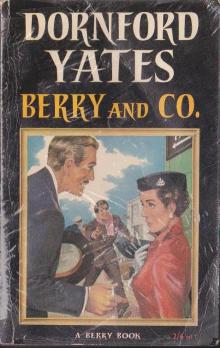 Berry and Co.
Berry and Co.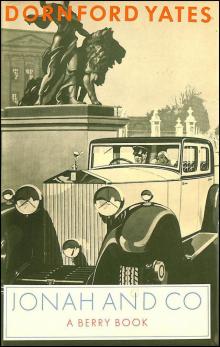 Jonah and Co.
Jonah and Co.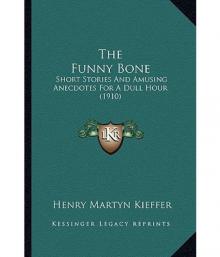 The Funny Bone: Short Stories and Amusing Anecdotes for a Dull Hour
The Funny Bone: Short Stories and Amusing Anecdotes for a Dull Hour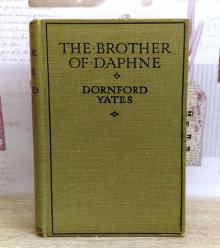 The Brother of Daphne
The Brother of Daphne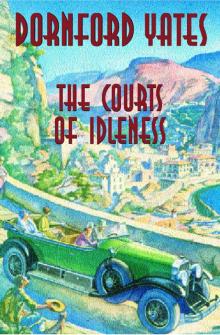 Courts of Idleness
Courts of Idleness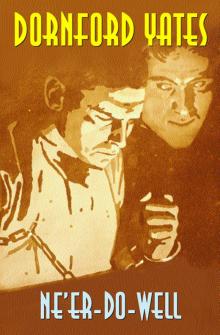 Ne'er Do Well
Ne'er Do Well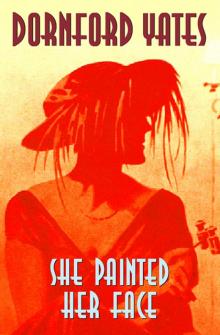 She Painted Her Face
She Painted Her Face Safe Custody and Laughing Bacchante
Safe Custody and Laughing Bacchante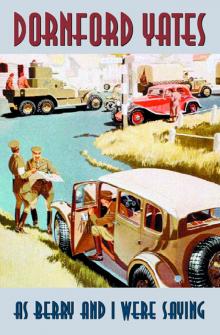 As Berry and I Were Saying
As Berry and I Were Saying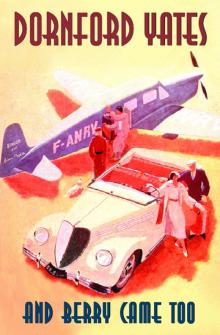 And Berry Came Too
And Berry Came Too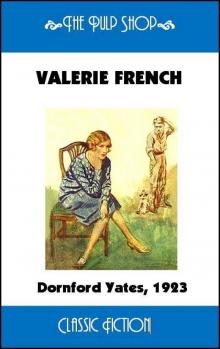 Valerie French (1923)
Valerie French (1923)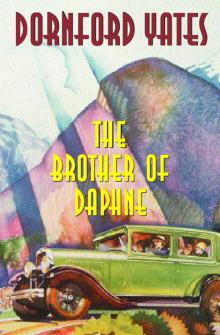 Brother of Daphne
Brother of Daphne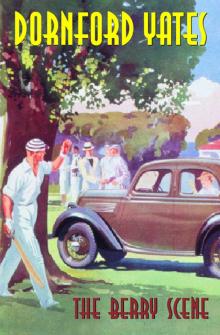 Berry Scene
Berry Scene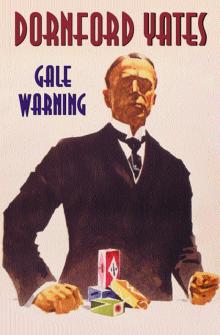 Gale Warning
Gale Warning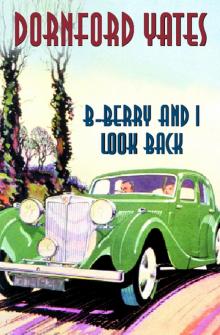 B-Berry and I Look Back
B-Berry and I Look Back Storm Music (1934)
Storm Music (1934)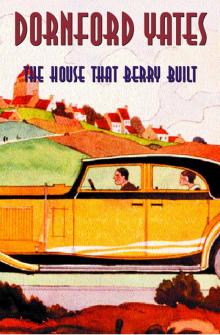 House That Berry Built
House That Berry Built